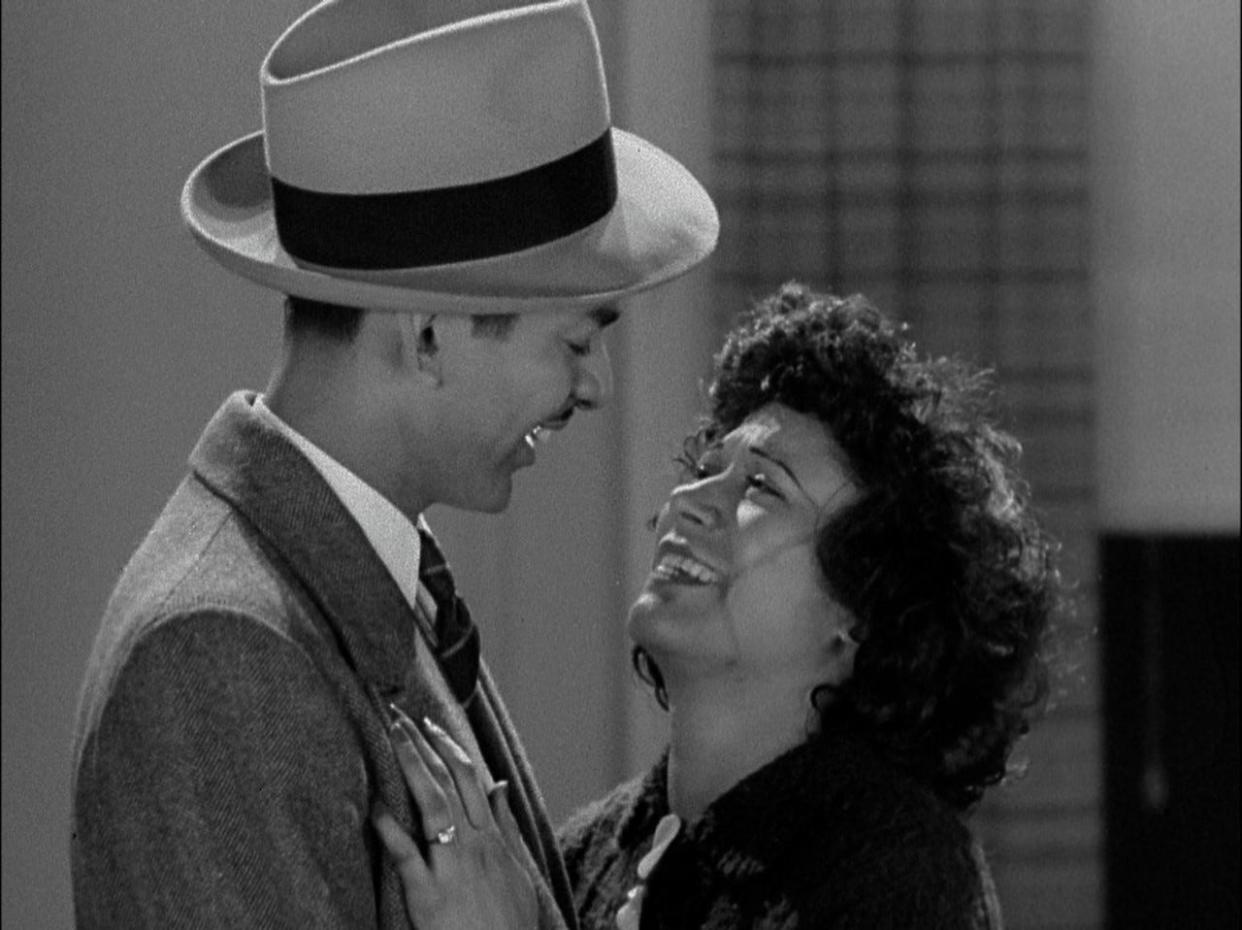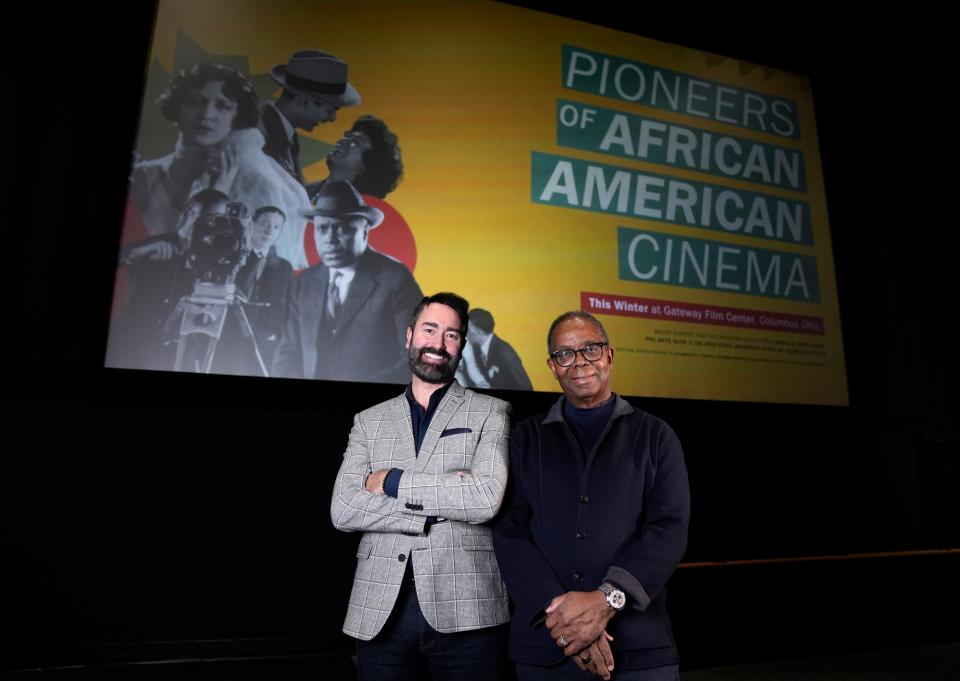'Pioneers' of Black cinema to be featured at Gateway Film Center

- Oops!Something went wrong.Please try again later.
- Oops!Something went wrong.Please try again later.
Black filmmaker Oscar Micheaux contained multitudes: He was an artist of the first order, a businessman of rare ingenuity and a pioneer by any measure.
During an era in which Hollywood closed its doors to Black filmmakers — and often produced films that either reflected or propagated racist attitudes and ideas — Micheaux (1884-1951) found a way to finance, produce and distribute his films, which unflinchingly engaged with issues of race and prejudice.
Italian filmmaker Francesco Zippel, who made the documentary “Oscar Micheaux: The Superhero of Black Filmmaking,” describes Micheaux as “the most independent” of all directors.
“He used to go to cinemas or to churches, and he asked for advances on (a) movie to come up with a budget,” Zippel said in a recent interview from Rome. “Most of the time, he was paying part of the cast and crew after he got the first income from the movie when it came out. He was traveling with the copies of the movie in his bag, and he was distributing the film on his own. That was really wild, if you think about it.”
Micheaux will be given his due in a new film series at the Gateway Film Center, “Pioneers of African American Cinema.”
Year in review:Blockbusters abound, but local film scene also booms
Over the course of three months, the film center will screen notable works from the dawn of Black cinema, including Micheaux’s silent drama “Within Our Gates” (1920) on Thursday, Frank Peregini’s “The Scar of Shame” (1929) on Feb. 3, and Micheaux’s sound feature “Birthright” (1939) on March 4. An hour-long program of short films will be shown on Friday (and short films will follow the February and March screenings).
The film center aims to illuminate the work of Black actors and behind-the-scenes artists who blazed their own trails. Today, many of the films they made are little-known and little-seen — a consequence of their being produced far from, and in opposition to, Hollywood.
“You have to be deliberate to introduce some of these filmmakers and films that, in some cases with this program, are nearly a century old,” said film center President and CEO Chris Hamel. “It takes an intervention such as this one to make people aware of someone like Micheaux.”
The films shown were taken from a larger pool of films by Black filmmakers that have been restored and made available by the arthouse film distributor Kino Lorber. Hamel first had the notion of bringing the series to Columbus prior to the pandemic, but it took several years to make it a reality.
Columbus attorney and arts patron Larry H. James, who sits on the board of the film center, was an early supporter of the series and ultimately provided significant funding along with his wife, Donna. Other major funding was provided by a PNC Foundation grant and the Ohio State University Office of Academic Affairs, the film center said.
James was receptive to supporting the series because he had just read Columbus-born author Wil Haygood’s acclaimed 2021 book on Black cinema, “Colorization: One Hundred Years of Black Films in a White World.”

“It was high on my agenda and my mind,” James said. “Chris asked whether Donna and I would do the seed money for it. And it’s like that line, ‘You had me at hello.’”
The films, James added, may be a revelation to contemporary Black audiences, too.
“The idea of reintroducing not only to America as a whole but to Black America and to say, ‘This is such a proud moment in history and we did so much with so little,’” he said.
Film:Pam Grier talks career and collard green martinis
The series will open Thursday with a screening of “Within Our Gates,” starring Evelyn Preer, Flo Clements and James D. Ruffin. The film presents a love triangle against a stark background of racial prejudice and violence, including a lynching.

“I think it’s one of the bravest films that he ever made,” said Zippel, noting that “Within Our Gates” was meant to challenge D.W. Griffith’s 1915 “The Birth of a Nation,” a landmark silent film which was noted for its contributions to cinematic grammar but became infamous for its virulent racism.
“(Micheaux) was an activist in his very own way, without even being totally aware of it,” Zippel said.
Although the films to be shown are available on Blu-ray and DVD from Kino Lorber, the Gateway Film Center series will offer the rare opportunity to experience them on the big screen.
“You can’t watch (the films) at home by yourself and have the same experience,” Hamel said. “You need to see them with other people who are learning and care and (whom) you can have a shared experience with.”
In the case of “Within Our Gates,” the screening boasts an extra component that can only be experienced in-person: live musical accompaniment from musicians of the Jazz Arts Group.
Upon being asked to assemble and perform a score for “Within Our Gates,” JAG Director of Affiliate Musicians Louis Tsamous tapped JAG musician Dave Powers to serve as the musical director on the project.
“(Powers) specializes in older music — he has an unbelievable record collection: Edison discs and 78s and all types of old music,” Tsamous said. “He’s putting together a score for the movie that we will play as they screen the movie.”
The ensemble will consist of Powers on piano, Tsamous and Reggie Jackson on percussion, Edwin Byard on soprano sax, Miles Smith on trumpet and Ryan Hamilton on trombone.
“(Powers) has been watching the film over and over again and coming up with themes and music to play during the film,” said Tsamous, adding that the ensemble seeks to not only be true to the music of the period but also to the mood of the movie.
“It’s a really heavy film, so the music will hopefully reflect all of that,” he said.
In addition to the screenings, the film center will have on view an exhibit of prints, black-and-white film stills and other ephemera, including movie art, through March 31.
“We’re also going to be screening countless hours of footage in the gallery space (on three monitors),” Hamel said.
James notes that for these historically important screenings to take place at a commercial movie theater, rather than in a college or university setting, is in itself notable — and may draw audiences beyond cinephiles.

“That’s what makes this so unique,” James said. “And I think with success, we can do it again.”
Added Hamel: “Hopefully, this is a program that can return year after year and give people opportunities to see these films together.”
Those who see the screenings, now or in the future, will discover that Black filmmakers have been telling the stories of their communities, from their perspective, for a long time — and against steep odds.
“We will get an entirely different perspective on Blacks in film with the films that are being shown,” James said. “Those who grew up in the ’50s and ’60s with ‘Amos 'n' Andy’ and the like, and other stereotypical Blacks in film, will say, ‘I had no idea this was going on.’”
At a glance
The series “Pioneers of African American Cinema” will begin on Thursday at the Gateway Film Center, 1550 N. High St. A reception at 5:30 p.m. will be followed by a screening of “Within Our Gates,” with live accompaniment by the Jazz Arts Group. Tickets cost $125, or $35 for film center members. For more details and a full schedule, visit gatewayfilmcenter.org/pioneers.
This article originally appeared on The Columbus Dispatch: Gateway Film Center's Pioneers of African American Cinema kicks off

